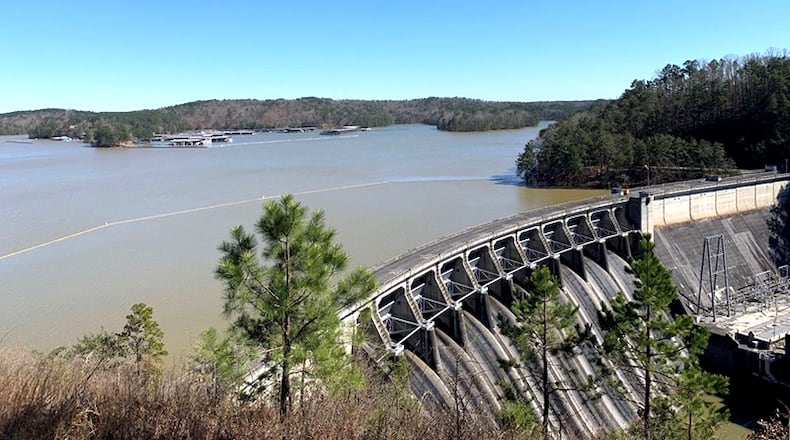A federal judge handed the state of Georgia and Metro Atlanta another legal victory on Thursday when it ruled against Alabama in one of several long-running disputes over management of the states’ shared water supplies.
The decision by a Washington, D.C., district judge in this installment of the so-called “water wars” marks the latest in a string of victories Georgia has notched in recent years.
In 2021, the U.S. Supreme Court delivered the most significant ruling to date in the saga when it ruled against Florida, which had argued water use from the Chattahoochee and Flint rivers by Georgia residents during a 2012 drought killed its iconic oyster industry in the Apalachicola Bay.
The case decided Thursday concerns a different river basin and does not involve Florida, but is a significant twist in the ongoing legal jostling, which has spanned three decades and has often pit Georgia against its neighbors downstream.
Here’s what you need to know about the ruling.
What was this case about?
While the Supreme Court case centered on the Apalachicola-Chattahoochee-Flint (ACF) River Basin, the case decided Thursday focuses on the Alabama-Coosa-Tallapoosa (ACT) Basin.
The ACT originates in North Georgia with the Etowah River, before flowing through the heart of Alabama and emptying into the Gulf of Mexico near Mobile. Along its way, it fills several major reservoirs, including Lake Allatoona in Bartow, Cherokee and Cobb counties, which is at the heart of this case.
Like many other reservoirs in the ACT system, Lake Allatoona is managed by the U.S. Army Corps of Engineers.
Credit: Drought.gov
Credit: Drought.gov
In 2015, the Corps adopted a revised “master manual” for managing the river system and water levels in its reservoirs. The original plaintiffs in the case — the state of Alabama and Alabama Power, a subsidiary of Atlanta-based Southern Company — took issue with the operational plan and sued the Corps. The state of Georgia also intervened as a defendant.
The Alabama plaintiffs argued that the Corps holds too much water back in Allatoona, and that the decreased flows result in poor water quality and greater water insecurity risk in times of drought. They also claimed the Corps’ water curtailments compromise hydropower generation at dams downstream.
They claimed the Corps’ plan violated the federal Clean Water Act and the National Environmental Policy Act, which requires federal agencies to determine whether their actions will cause serious environmental effects.
The water and sewer boards for the cities of Montgomery and Mobile also joined the case, arguing that the Corps’ actions compromise their water supplies and lead to more saltwater intrusion in Mobile Bay.
How did the court rule?
In a sprawling, 299-page decision, U.S. District Court Judge Emmet G. Sullivan rejected the plaintiffs’ claims, finding that the Corps followed the law in crafting its ACT basin “master manual.”
Sullivan concluded that the Corps has wide latitude to adjust operations of the river system and found it had thoroughly investigated the environmental impacts of its new management plan.
“... The Court agrees with Defendants that the Corps crafted ‘modest incremental changes to’ the ACT Master Manual that appropriately considered and balanced the various applicable specific and general project purposes, and therefore ‘in no way has exceeded its authority,’” Sullivan wrote.
In a statement, Gov. Brian Kemp’s office said the decision “represents the greatest achievement in securing water supply for Metro Atlanta since Georgia’s win before the U.S. Supreme Court,” and that it brings the state one “step closer to ending the decades-long Water War.”
Katherine Zitsch, the senior water policy advisor for the Atlanta Regional Commission, said in a statement that the court’s decision would benefit all water users, but added that, “Our work isn’t done.”
“We will continue to be good stewards of our shared waters and, when necessary, to defend our water supply needs in court.”
Requests for comment sent to the office of Alabama’s attorney general, Steve Marshall, and Alabama Power were not immediately returned. The U.S. Army Corps of Engineers also did not respond to a request for comment before publication. Many federal and state offices were closed Friday in observance of Veterans Day.
Does this mean the ‘water wars’ are over?
Far from it.
The plaintiffs could appeal the D.C. district judge’s ruling, but it was not immediately clear whether they will.
The court also did not weigh in on a separate part of the case involving Lake Allatoona. In 2021, the Corps of Engineers granted Metro Atlanta’s request to store additional water in the lake to serve the city of Cartersville and Bartow County.
The Corp’ concluded that move would have no “appreciable effects on flows at the Alabama-Georgia state line, drought triggers, or water quality.” Still, Alabama has challenged the extra water awarded to those communities and the matter is pending in district court in D.C.
Alabama is also engaging Georgia and the Corps in a separate legal battle, this time over the “master manual” for the Apalachicola-Chattahoochee-Flint (ACF) River Basin. In 2021, a judge in the Northern District of Georgia ruled in the Corps’ favor and upheld the manual, but Alabama has appealed the ruling to the 11th Circuit Court of Appeals. It’s unclear when that court might weigh in.
About the Author






